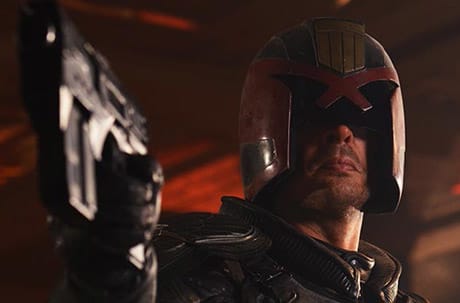Do yourself a favour: if you've seen 1995's tremendously hokey Judge Dredd starring Sylvester Stallone, purge all memories immediately and approach this version of the gritty British comic property with an open mind.
In the hands of talented native UK screenwriter Alex Garland (28 Days Later) and director Pete Travis (Vantage Point), the future's most famous uncompromising lawman is invigorated by a distinct sense of moral purpose and anchored by a simple, but engaging procedural story that succinctly introduces this dystopian world.
America has become an irradiated wasteland, with the remains of civilization relegated to life in giant, gated "Mega City," which spans from Boston to Washington. Under such harsh environs, society verges upon anarchy, with the judicial process concentrated into an elite force of peacekeepers that wield the responsibilities of judge, jury and executioner, usually in the field and on the spot.
After a brief car chase and introduction to how a hostage negotiation goes down when a "Judge" is involved (it doesn't, but the perp does), the titular enforcer of justice is saddled with the field evaluation of a highly psionic recruit who narrowly failed the written exam.
While investigating a multiple homicide, the tricked-out justice-dispensers are targeted by a brutal gang responsible for the production of perception-altering drug SLO-MO. The drug is a euphoric that does exactly what its street name implies, providing the film with an actual reason to indulge in highly stylized scenes of super-slow motion carnage.
Creative, graphic brutality is Dredd's stock and trade, coupled with stereoscopic imaging (3D) so extreme viewers might feel like they should be wearing a psychological splatter-guard. However, there's a little more going on here than comparable fare like above-average, but ideologically toothless and uneven martial arts police actioner The Raid.
From an unselfconscious cast headed by Karl Urban and featuring solid supporting work by Lena Hedley (Game of Thrones), Wood Harris (The Wire) and Olivia Thirlby (Being Flynn), to the dehumanizing, utilitarian architecture of Mega City One's stacked grid layout, and stark depictions of cause and effect, Dredd is designed to inspire a sense of depraved hopelessness that can only be answered by a merciless adherence to a strict code of conduct, superseded occasionally by greater moral imperatives.
With a foundation this solidly laid and a deep well of morally complex mythology to draw from, I have but one thing left to say: sequel please.
(Alliance)In the hands of talented native UK screenwriter Alex Garland (28 Days Later) and director Pete Travis (Vantage Point), the future's most famous uncompromising lawman is invigorated by a distinct sense of moral purpose and anchored by a simple, but engaging procedural story that succinctly introduces this dystopian world.
America has become an irradiated wasteland, with the remains of civilization relegated to life in giant, gated "Mega City," which spans from Boston to Washington. Under such harsh environs, society verges upon anarchy, with the judicial process concentrated into an elite force of peacekeepers that wield the responsibilities of judge, jury and executioner, usually in the field and on the spot.
After a brief car chase and introduction to how a hostage negotiation goes down when a "Judge" is involved (it doesn't, but the perp does), the titular enforcer of justice is saddled with the field evaluation of a highly psionic recruit who narrowly failed the written exam.
While investigating a multiple homicide, the tricked-out justice-dispensers are targeted by a brutal gang responsible for the production of perception-altering drug SLO-MO. The drug is a euphoric that does exactly what its street name implies, providing the film with an actual reason to indulge in highly stylized scenes of super-slow motion carnage.
Creative, graphic brutality is Dredd's stock and trade, coupled with stereoscopic imaging (3D) so extreme viewers might feel like they should be wearing a psychological splatter-guard. However, there's a little more going on here than comparable fare like above-average, but ideologically toothless and uneven martial arts police actioner The Raid.
From an unselfconscious cast headed by Karl Urban and featuring solid supporting work by Lena Hedley (Game of Thrones), Wood Harris (The Wire) and Olivia Thirlby (Being Flynn), to the dehumanizing, utilitarian architecture of Mega City One's stacked grid layout, and stark depictions of cause and effect, Dredd is designed to inspire a sense of depraved hopelessness that can only be answered by a merciless adherence to a strict code of conduct, superseded occasionally by greater moral imperatives.
With a foundation this solidly laid and a deep well of morally complex mythology to draw from, I have but one thing left to say: sequel please.
